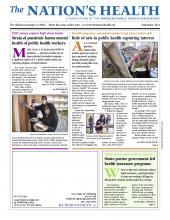
U.S. Surgeon General Murthy warns about the dangers of misinformation in July.
Screenshot by The Nation’s Health
Health misinformation is costing U.S. lives during the ongoing COVID-19 pandemic, the U.S. surgeon general warned this summer, and health professionals, educators and others must work together to address the problem.
In a July 15 public health advisory, U.S. Surgeon General Vivek Murthy, MD, labeled misinformation, defined as false, inaccurate or misleading information compared to best available evidence, a threat to U.S. public health.
While not new, health misinformation has reached new levels during the COVID-19 pandemic, hindering public health’s ability to provide vaccinations and end the pandemic. Dis-information, in which false information is spread to deliberately deceive people, has also been a major problem.
“We live in a world where misinformation poses an imminent and insidious threat to our nation’s health,” Murthy said during a White House media briefing. “While it often appears innocuous on social media apps and retail sites or search engines, the truth is that misinformation takes away our freedom to make informed decisions about our health and the health of our loved ones.”
While about 160 million people in the U.S. were fully vaccinated against COVID-19 as of July, millions more eligible people are not, and misinformation is a barrier. Even brief exposure to misinformation can lower someone’s intent to get vaccinated, a February Nature study found. As of May, 67% of unvaccinated U.S. adults believed or were unsure about a myth they had heard about COVID-19 vaccines, according to the Kaiser Family Foundation.
Health misinformation has previously undermined work to reduce HIV/AIDS and Ebola infection rates, and harms everyday health, “leading people to turn down effective treatments for cancer, heart disease or other illnesses,” Murthy said in the advisory.
To combat the problem, Murthy called for an “all-of-society” approach. The majority of the 22-page advisory is made up of recommendations aimed at leaders in education, media, medicine, research, technology, government, and the general public.
“The good news is there are steps all of us can take,” Murthy said during the briefing.
The advisory asks health professionals, who are a trusted source, to proactively engage with their patients by listening and correcting misinformation in a non-technical, personalized way. Training can be provided to help clinicians communicate with their patients, the advisory said. Professional associations can help their members serve as experts and share science-based information online and with the media. And health workers and organizations can partner with local groups to address community concerns and develop specialized messaging. Individuals can also play a role by not spreading misinformation, checking with credible sources before sharing, listening with empathy to people who have concerns, working to establish common ground and generally addressing health misinformation in their communities.
“We must confront misinformation as a nation,” Murthy said. “Every one of us has the power and the responsibility to make a difference in this fight. Lives are depending on it.”
For more information on “Confronting Health Misinformation: The U.S. Surgeon General’s Advisory on Building a Healthy Information Environment,” visit www.surgeongeneral.gov/healthmisinformation.
- Copyright The Nation’s Health, American Public Health Association









